

Plan-Do-Check-Act (PDCA) - From MindTools.com. Also known as the "Deming Wheel," "Shewhart Cycle" and PDSA © GettyImagesanyaivanova The PDCA cycle encourages a commitment to continuous improvement. Imagine that your customer satisfaction score on a popular business ratings website has dipped. When you look at recent comments, you see that your customers are complaining about late delivery, and that products are being damaged in transit. Five tips to get the most out of your workday. Getting a lot done each day is about more than just having the right productivity tools and setup.
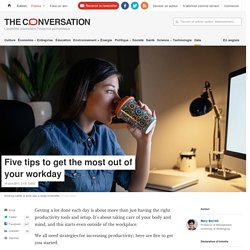
It’s about taking care of your body and mind, and this starts even outside of the workplace. We all need strategies for increasing productivity; here are five to get you started. 1) Get a good night’s rest The first key to productivity is plenty of sleep. Getting 7-8 hours sleep a night will flow through into your work, from sharper decision making and problem solving, to better coping with change. How I Learned High School Grades Don’t Determine Your Whole Life. While we’re in high school we all come across common myths surrounding careers and our futures, and it can really do your head in!

Teachers, parents, siblings and friends all tell you different things. Lately we’ve been talking with people and found that these myths aren’t as true as we first thought. And were debunking them, right here, right now. Mythbuster style. The Top 4 Ways To Stop Stressing And Actually Start Studying. Question 1.
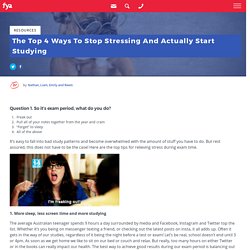
Millennial Women Conflicted About Being Breadwinners. The general consensus of this group seems to be that the theory of being the partner who earns more is appealing to millennial women.

They want their partners to feel happy and free and like they shouldn’t be expected to support the entire family unit simply based on their gender, but reality throws everyone for a loop. Being the breadwinner, or sole earner, raises the stakes for these respondents internally, in the same way it does for men externally. For many men, having a wife who doesn’t work isn’t just a financial burden, but a social status symbol.
9 Ways To Stay Positive In Difficult Times Infographic. Other Infographics 9 Ways To Stay Positive In Difficult Times Infographic 9 Ways To Stay Positive In Difficult Times Infographic Everyone has reason to be discouraged and start thinking negatively.
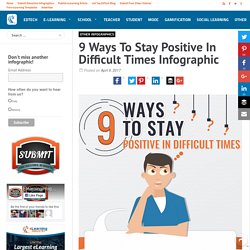
Like most people, you probably felt the same too. Here are the key points from the infographic to change yourself into a more positive person. 1.Take a Step Back From Your Problem. 7 Ways to Put Life Back in Work-Life Balance Infographic. Other Infographics 7 Ways to Put Life Back in Work-Life Balance Infographic 7 Ways to Put Life Back in Work-Life Balance Infographic Work–life balance is a concept including proper prioritizing between “work” (career and ambition) and “lifestyle” (health, pleasure, leisure, family and spiritual development/meditation).
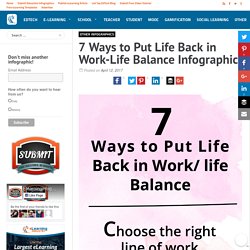
Related, though broader, terms include “lifestyle calm balance” and “lifestyle choices”. How to Make Difficult Decisions Infographic. Other Infographics How to Make Difficult Decisions Infographic How to Make Difficult Decisions Infographic Decision-making can be a paralyzing prospect: the big choices we face about how we live and work have ramifications a long way down the line.
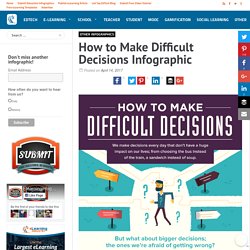
Without 20/20 foresight, the options available to us can pose a potentially endless series of knock on-effects – for better or worse. The use of tried-and-tested decision-making strategies, however, has been shown to cut failure rates by nearly 50%, suggesting that with applied technique, making your choice needn’t be an intimidating task. Before even approaching a decision, it is advisable to make sure you fully understand the issue at hand. With a clearer idea of what is at the root of the issue, the next stage – brainstorming – will produce a more appropriate set of options. Developing Resilience - Career Development from MindTools.com. Overcoming and Growing From Setbacks © iStockphotosubman Find the strength to keep going.

I have not failed. I've just found 10,000 ways that won't work. – American inventor, Thomas Edison According to legend, Thomas Edison made thousands of prototypes of the incandescent light bulb before he finally got it right. In spite of struggling with "failure" throughout his entire working life, Edison never let it get the best of him. The PRACTICE Model - Team Management Training From MindTools.com. Finding the Best Solution to a Problem © iStockphotoBeachcottagePhotography Help your coachees get on the right path.

The only solutions that are ever worth anything are the solutions that people find themselves. – Satyajit Ray, film maker. Wheel of Life - Infographic. Mind Tools Newsletter 361. Mind Tools will treat your email address with complete respect and will not circulate it to any third party.
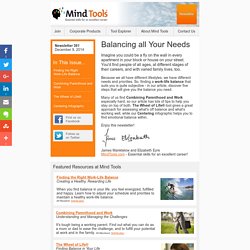
It turns out hot-desking isn't all it's cracked up to be. A recent survey of 400 multinational corporations found that two-thirds plan to implement shared-desk workplaces by 2020. But research shows these arrangements have a range of outcomes, many of which are negative. A recently published study of 1,000 Australian employees found that shared-desk environments had a number of problems. These included increased distrust, distractions, uncooperative behaviour and negative relationships.
On top of this, there was a decreased perception of support from supervisors. Another study showed that shared-desk environments can lead to employee marginalisation, indifference and inattention to co-workers, loss of identity and decreased organisational commitment. These studies and more should sound a cautionary note against the uptake of shared-desk arrangements. Changing workspaces Office spaces are changing rapidly thanks to remote work, technology and the need to innovate.
Office space is typically the second-biggest cost for organisations. Smartphones are the New Cigarettes. I go to this boot camp-style class sometimes at a gym near my apartment. It’s one of those classes where a coach stands there and yells at you to do more pushups and squats until you think you’re going to puke. Then you go home and struggle to sit on a toilet for the next three days. It’s great. I love it. I never miss a week.
Today, as happens many mornings, a couple of people, in between exercises, ran over to the wall to pick up their phones and check… well, I don’t know what the fuck they could have been checking. Log In - New York Times. If You Knew Something Would Improve Your Life, Why Wouldn’t You? When you’re caught in a self-defeating cycle, it can feel impossible to get out. Quite disturbingly, you begin to believe the suffocation of negativity is “normal.” As Dr. Joe Dispenza has said, “What if just by thinking we make our inner alchemy out of the normal state, the self-regulation system of the body eventually considers this abnormal state to be the normal one?” Put simply, your mind, body, and emotions adapt to your expectations and standards.
If you become comfortable in the “abnormal” state of self-defeat and skepticism, your body and brain literally adjust themselves to meet that reality. Cookies are Not Accepted - New York Times. It turns out hot-desking isn't all it's cracked up to be. What If We Don't Have One True Calling? 6 shitty jobs and the lessons I learned. These days I talk to a lot of copywriters who’ve always been copywriters.
I have pairs of socks older than some who are now running highly successful copywriting businesses. Log In - New York Times. Log In - New York Times. Information Avoidance: How People Select Their Own Reality. Monday, March 13, 2017 By Shilo Rea We live in an unprecedented "age of information," but we use very little of it. Dieters prefer not to look at the calories in their tasty dessert, people at high risk for disease avoid screenings and people choose the news source that aligns with their political ideology.